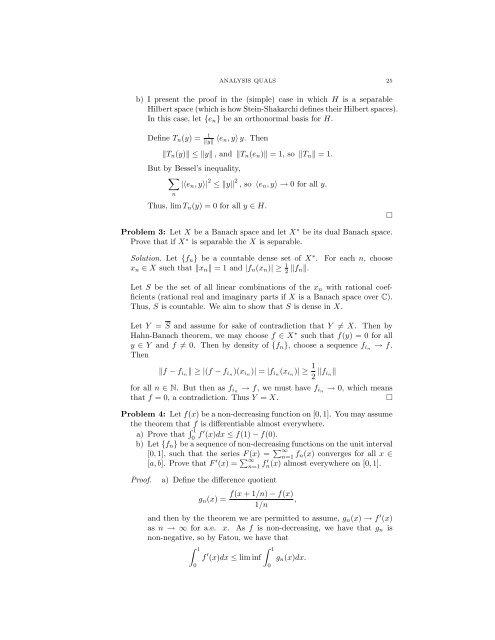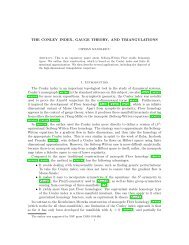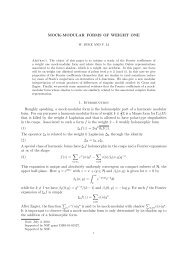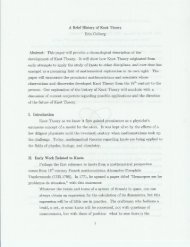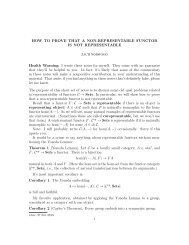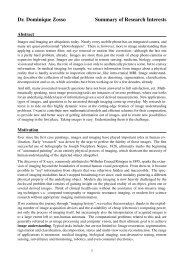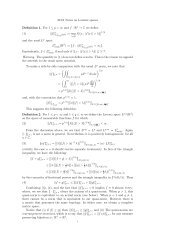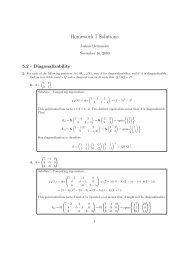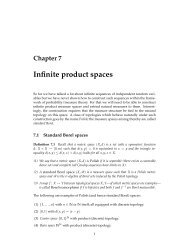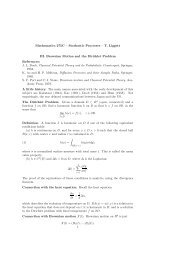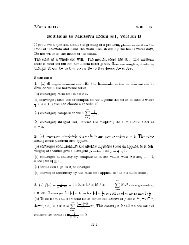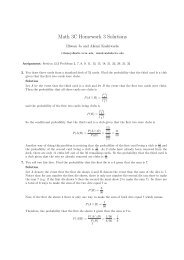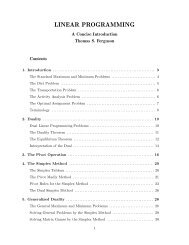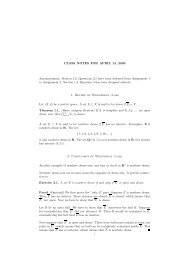ANALYSIS QUALIFYING EXAM PROBLEMS BRIAN LEARY ...
ANALYSIS QUALIFYING EXAM PROBLEMS BRIAN LEARY ...
ANALYSIS QUALIFYING EXAM PROBLEMS BRIAN LEARY ...
You also want an ePaper? Increase the reach of your titles
YUMPU automatically turns print PDFs into web optimized ePapers that Google loves.
<strong>ANALYSIS</strong> QUALS 25<br />
b) I present the proof in the (simple) case in which H is a separable<br />
Hilbert space (which is how Stein-Shakarchi defines their Hilbert spaces).<br />
In this case, let {en} be an orthonormal basis for H.<br />
Define Tn(y) = 1<br />
y 〈en, y〉 y. Then<br />
Tn(y) ≤ y , and Tn(en) = 1, so Tn = 1.<br />
But by Bessel’s inequality,<br />
<br />
n<br />
|〈en, y〉| 2 ≤ y 2 , so 〈en, y〉 → 0 for all y.<br />
Thus, lim Tn(y) = 0 for all y ∈ H.<br />
Problem 3: Let X be a Banach space and let X ∗ be its dual Banach space.<br />
Prove that if X ∗ is separable the X is separable.<br />
Solution. Let {fn} be a countable dense set of X ∗ . For each n, choose<br />
xn ∈ X such that xn = 1 and |fn(xn)| ≥ 1<br />
2 fn.<br />
Let S be the set of all linear combinations of the xn with rational coefficients<br />
(rational real and imaginary parts if X is a Banach space over C).<br />
Thus, S is countable. We aim to show that S is dense in X.<br />
Let Y = S and assume for sake of contradiction that Y = X. Then by<br />
Hahn-Banach theorem, we may choose f ∈ X∗ such that f(y) = 0 for all<br />
y ∈ Y and f = 0. Then by density of {fn}, choose a sequence fin → f.<br />
Then<br />
1<br />
f − fin ≥ |(f − fin )(xin )| = |fin (xin )| ≥ fin 2<br />
for all n ∈ N. But then as fin → f, we must have fin → 0, which means<br />
that f = 0, a contradiction. Thus Y = X. <br />
Problem 4: Let f(x) be a non-decreasing function on [0, 1]. You may assume<br />
the theorem that f is differentiable almost everywhere.<br />
a) Prove that 1<br />
0 f ′ (x)dx ≤ f(1) − f(0).<br />
b) Let {fn} be a sequence of non-decreasing functions on the unit interval<br />
[0, 1], such that the series F (x) = ∞<br />
n=1 fn(x) converges for all x ∈<br />
[a, b]. Prove that F ′ (x) = ∞<br />
n=1 f ′ n(x) almost everywhere on [0, 1].<br />
Proof. a) Define the difference quotient<br />
gn(x) =<br />
f(x + 1/n) − f(x)<br />
,<br />
1/n<br />
and then by the theorem we are permitted to assume, gn(x) → f ′ (x)<br />
as n → ∞ for a.e. x. As f is non-decreasing, we have that gn is<br />
non-negative, so by Fatou, we have that<br />
1<br />
0<br />
f ′ (x)dx ≤ lim inf<br />
1<br />
0<br />
gn(x)dx.


